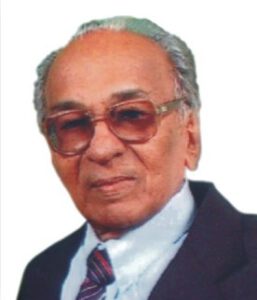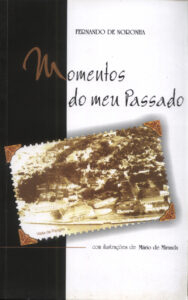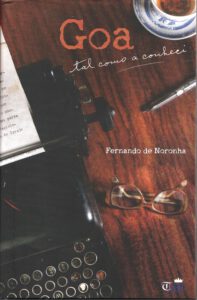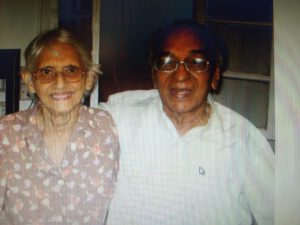
Early this month the social media was abuzz, in anticipation of the twenty-twenties; as for me, I was on a solo trip back to nineteen-twenty. As a child, this year had the earmarks of a happy milestone for me, yet it triggered anxiety for the future. My childhood was a shrine of happy pictures, yet the thought of that golden marker fading into the horizon would fill me with sadness. Why? Because while a young me was looking ahead to what would be, my father Fernando was already looking back upon what had been….
My lone source of anxiety for the future was that I was the eldest child, born in Papa’s forty-fourth year. I knew not how long I would have him: it was a worry I kept to myself so as not to dishearten him. But then, hardly anything disheartened him; he kept pace with his children and even his grandchildren’s progress, and enjoyed the sleep of the just. When he passed on, at 91, he was a grandfather to fifteen. His abiding trust in God was the secret of his longevity – as well as a salutary lesson on the futility of anxiety.
In my naiveté, 1920 still felt charming; as I grew older, I found Papa’s idealism, independence and integrity appealing. I looked up to him, especially because his life hadn’t been easy: the ‘roaring twenties’ of the West had played out quite differently in Portugal and Goa. Following a decade of political turbulence and galloping inflation, the country stabilised and the escudo roared upon the rise of Salazar the economist. Convinced that he was a man with ‘the right intention’, my father held him in esteem for his intellect and honesty – the antithesis of leaders in sham democracies.
After God, it was Goa uppermost in Papa’s mind. The Mass and the Bible alongside spiritual classics were his daily fare. To compensate for arid bureaucratic matters, he put his faith in reading, writing, teaching and music. Even while he took delight in the Romantics Eça, Camilo and Ramalho, he recommended some excellent Goan writers. Until his last breath he lapped up the masters of the Portuguese language, not forgetting two of our very own Goan purists, Costa Álvares and Filinto C. Dias.

One gets a bird’s eye view of Papa’s outlook from his first book, Momentos do meu Passado (Moments from my Past). Much of it is what he used to recount animatedly at the dinner table or talk over with relatives and friends. He obliged us by writing this slim volume comprising ‘figures, facts and facetiae’: pen sketches of over thirty personalities from the Goan social and political milieu; some little-known facts of contemporary history; and a host of anecdotes dating back to his Lyceum days. In his words, he wished ‘to quench saudades of a not so distant past, when one lived in a happy and carefree manner unique to Goa.’
It took me some time to appreciate Papa’s simple and straightforward nature. And noticing how people would often agree but also end up severing ties with him, I learnt that truth can indeed puzzle, confound, hurt… Papa’s intermittent observations on public affairs are lost in the thicket of Heraldo and A Vida for, whilst a bureaucrat in two key departments during the Portuguese regime, he used pen names of which he kept no record. In 1967, his commitment to ferry people to the booths on the occasion of the Opinion Poll (16 January, his birthday and feast of St Joseph Vaz) fetched him a resounding office memo.

It warms the cockles of our hearts to see that Papa’s second book, Goa tal como a conheci (Goa as I knew it), contains the essence of his views on people, events and ideas. Covering as he did twentieth-century Goa’s political and administrative affairs, society, culture, and religion, in a total of eighteen chapters, this offering is a testimony of love for the land and the people. It is also a tribute to the Portuguese language that was so dear to him. After opting to retire from public service, he taught that idiom at a city college and co-founded a weekly, A Voz de Goa. At Panjim’s Immaculate Conception church he prayed in that ‘language of the angels’ and put together a choir at Sunday mass.
Music was high up on his agenda ever since his father purchased a gramophone and a maternal uncle and self-taught violin virtuoso played along. An attractive feature of Papa’s day was his whistling and playing of the harmonica, providing the household with a kind of crash course in classical and semi-classical music. The mandó moved him very especially (he ensured that it featured at his children’s wedding parties) and so did two popular Konkani films of his time which, he said, ‘foster Goan patriotic feelings’. The Goan reality, however, was a far cry from what he had envisioned, so I can say with Wodehouse that ‘if not actually disgruntled, he was far from being gruntled.’

No tribute to our father would be complete without a reference to our dearest mother Judite da Veiga, who was the love of his life, the reason of his being. On his death bed I heard him thank her for half a century of togetherness. She, their five boys and families, was all that he ever wanted. We have lost him in body, not in spirit. He has become greater in death, our strength and consolation, our conviction that there can be no anxiety for the future….
Herald, 19.01.2020, published an abridged version
For this full version see Revista da Casa de Goa (Lisbon), March-April 2020